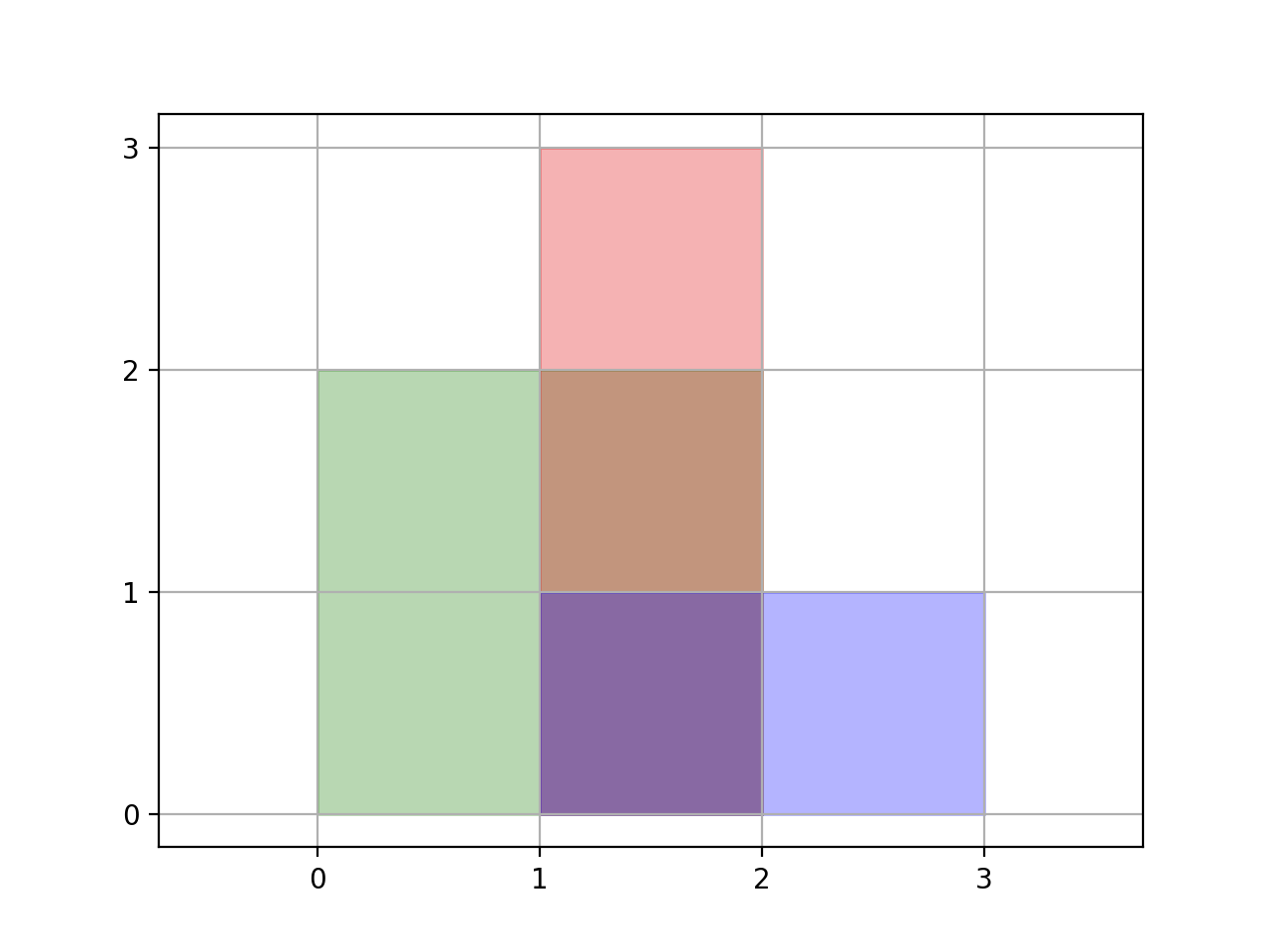Algorithm
Problem Name: 850. Rectangle Area II
You are given a 2D array of axis-aligned rectangles. Each rectangle[i] = [xi1, yi1, xi2, yi2] denotes the ith rectangle where (xi1, yi1) are the coordinates of the bottom-left corner, and (xi2, yi2) are the coordinates of the top-right corner.
Calculate the total area covered by all rectangles in the plane. Any area covered by two or more rectangles should only be counted once.
Return the total area. Since the answer may be too large, return it modulo 109 + 7.
Example 1:

Input: rectangles = [[0,0,2,2],[1,0,2,3],[1,0,3,1]] Output: 6 Explanation: A total area of 6 is covered by all three rectangles, as illustrated in the picture. From (1,1) to (2,2), the green and red rectangles overlap. From (1,0) to (2,3), all three rectangles overlap.
Example 2:
Input: rectangles = [[0,0,1000000000,1000000000]] Output: 49 Explanation: The answer is 1018 modulo (109 + 7), which is 49.
Constraints:
1 <= rectangles.length <= 200rectanges[i].length == 40 <= xi1, yi1, xi2, yi2 <= 109
Code Examples
#1 Code Example with Javascript Programming
Code -
Javascript Programming
const rectangleArea = function(rectangles) {
let xnodes = rectangles.reduce((arr, rect) => {
arr.push(rect[0], rect[2])
return arr
}, [])
xnodes = [...new Set(xnodes)].sort((a, b) => a - b)
let res = 0n
let overlay
let ynodes
let ysum
for (let i = 1; i < xnodes.length; i++) {
overlay = []
rectangles.forEach(rect => {
if (rect[0] <= xnodes[i - 1] && rect[2] >= xnodes[i]) overlay.push(rect)
})
ynodes = overlay.reduce((set, rect) => {
set.add(rect[1])
set.add(rect[3])
return set
}, new Set())
ynodes = [...ynodes].sort((a, b) => a - b)
ysum = 0n
for (let i = 1; i < ynodes.length; i++) {
for (let j = 0; j < overlay.length; j++) {
if (overlay[j][1] <= ynodes[i - 1] && overlay[j][3] >= ynodes[i]) {
ysum += BigInt(ynodes[i] - ynodes[i - 1])
break
}
}
}
res += ysum * BigInt(xnodes[i] - xnodes[i - 1])
}
return Number(res % BigInt(Math.pow(10, 9) + 7))
}
Input
Output
#2 Code Example with Python Programming
Code -
Python Programming
class Solution:
def rectangleArea(self, rectangles):
xs = sorted(set([x for x1, y1, x2, y2 in rectangles for x in [x1, x2]] + [0]))
x_i = {v: i for i, v in enumerate(xs)}
count = [0] * len(x_i)
L = []
for x1, y1, x2, y2 in rectangles:
L.append([y1, x1, x2, 1])
L.append([y2, x1, x2, -1])
L.sort()
cur_y = cur_x_sum = area = 0
for y, x1, x2, sig in L:
area += (y - cur_y) * cur_x_sum
cur_y = y
for i in range(x_i[x1], x_i[x2]):
count[i] += sig
cur_x_sum = sum(x2 - x1 if c else 0 for x1, x2, c in zip(xs, xs[1:], count))
return area % (10 ** 9 + 7)
Input
Output
